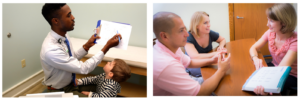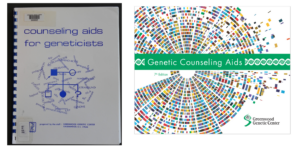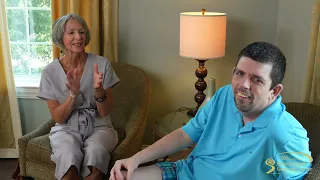Helping patients is our driving force. Being able to serve patients across all of South Carolina is just the icing on the cake! And this all starts with patients having ACCESS to genetic health services. South Carolinians have not always had easy access to clinical genetics, and the journey to get where we are today has not always been the easiest, but it has been worth it! Continue reading to see how the Greenwood Genetic Center (GGC) laid the foundation for accessible clinical genetic services in South Carolina.
GGC was established in 1974. Before then, the Medical University of South Carolina (MUSC) in Charleston had the only genetics clinic in the state. When clinical geneticist Dr. Wladimir Wertelecki left MUSC in 1974, it left a hole in the state – paving the way for GGC to establish accessible genetic healthcare throughout South Carolina.
GGC co-founder Dr. Roger Stevenson recognized the need to reach patients beyond Greenwood, and satellite clinics began to take shape in 1975 across the Coastal, Midlands, Pee Dee, and Piedmont regions of South Carolina. In close partnership with the SC Department of Disabilities and Special Needs, GGC clinicians regularly traveled across the state to serve patients from every county of SC, sometimes even renting a small plane for more distant clinics. Dr. Stevenson initially served as the sole geneticist with case workers, genetic associates, and genetic counselors organizing clinics, testing, and follow-up.
Over time, GGC’s presence throughout the state was strengthened with the addition of Dr. Richard Schroer, Dr. Robert Saul, and Dr. Curtis Rogers, along with genetic counselors, support staff, and other faculty members. Satellite offices in Columbia and Greenville opened in 1988, followed by Florence in 2004, and Charleston in 2007. The strategically located clinics made access to genetic care easier for all South Carolinians.

Today, ensuring access to genetics care remains the top priority. What began as small teams traveling the state has culminated to fully-staffed clinics with doctors, advanced practice practitioners, nurses, psychologists, clinical trial coordinators, genetic counselors, genetics assistants, and support staff. Each team member has their own skill set to provide patients with comprehensive care in the field of genetics and genomics. In the last fiscal year, our clinical team saw 5,325 patients! The clinics can even offer telehealth appointments and eVisits to give patients access to genetics without having to the leave home.
It was not too long ago that treatment options for genetic disorders were almost nonexistent. Now, geneticists are able to provide treatments such as enzyme replacement therapy for patients with lysosomal storage disorders, medication for conditions including achondroplasia and Friedrich’s ataxia, and even gene therapy for disorders like spinal muscular atrophy and sickle cell anemia. Most notably, our clinic recently participated in a clinical trial which led to the FDA approval of DAYBUETM, the first and only drug to specifically treat patients with Rett syndrome.

No discussion of the clinics would be complete without the mention of the internationally-known Genetic Counseling Aids, or the Greenwood “flip book.” In the 1980s, Dr. Schroer, a full-time clinical geneticist, was also responsible for the educational programs and materials at GGC. In 1984, the first edition of the Genetic Counseling Aids was published by Dr. Schroer, Dr. Hal Taylor, and Dr. William Potts. They were designed to help clinicians explain complex genetic concepts through simplified visual aids.
The Counseling Aids started with 34 pages. Now, in its 7th edition with 97 pages, GGC’s Counseling Aids are used by geneticists, genetic counselors, and other providers all over the world to help patients and their families understand complex topics such as inheritance patterns, inborn errors of metabolism, hereditary cancer, and genetic testing. Take it from this non-science major – THEY HELP!

In 2023, GGC established a Precision Medicine Initiative with four pillars (Access, Analysis, Answers, and Action) with the goal of providing patients with the right treatment at the right time. But even with all of the amazing technologies at hand and the promise of new treatments, none of that matters if patients don’t have ACCESS. Our Precision Medicine Initiative perfectly complements our 50 year effort to reach patients, remove barriers, and provide families with the innovative and compassionate care they all deserve.
Post by Caroline Pinson
